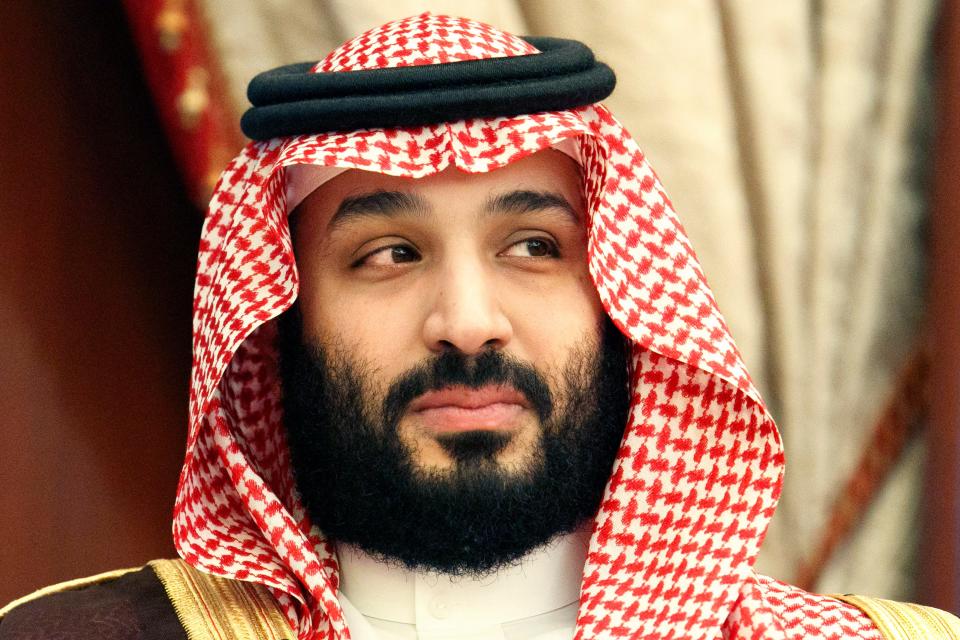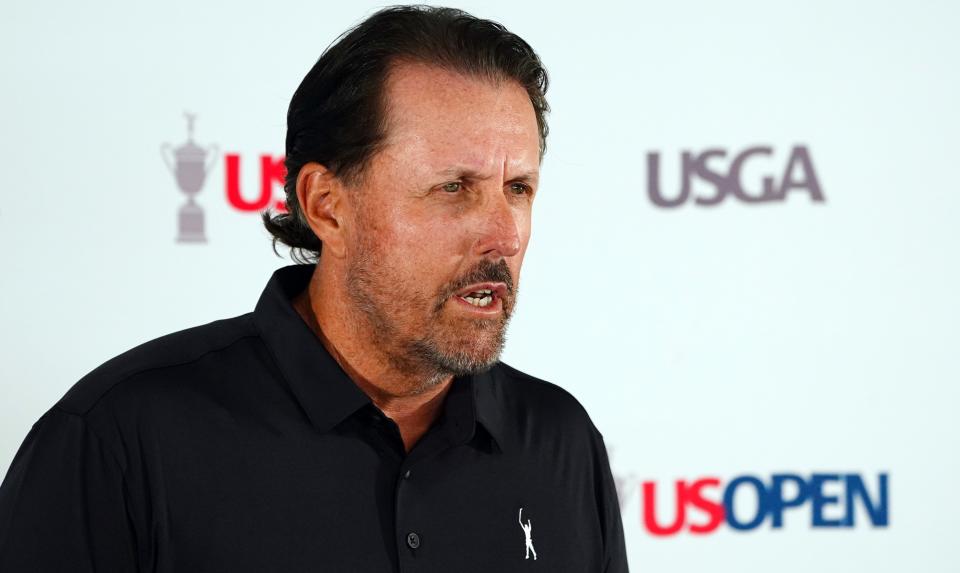Golf brought Saudi human rights abuses back to the fore ahead of Biden's visit

A thousand lashes for urging his government to celebrate Valentine's Day. Three years in jail for campaigning for the right for women to drive. An almost inconceivably gruesome murder that took place while trying to obtain a marriage license.
Saudi Arabia's human rights record has been thrust into the international spotlight anew as President Joe Biden prepares to visit the kingdom and after its decision to fund a new LIV golf league –bankrolled by the country's deep-pocketed sovereign wealth fund – which has lured some of golf's biggest stars and unleashed a firestorm in response. Critics say Saudi officials are engaged in "sportswashing" – using money and star athletes to polish a country's reputation and distract from abuses.
Torture, execution, extrajudicial killings, forced disappearances, arbitrary arrest, alleged war crimes and cruel, inhuman treatment of government critics – this is the real Saudi Arabia, according to human rights organizations, activists, dissidents and even the U.S. State Department.
During a news conference in Israel on Thursday, Biden defended his decision to visit Saudi Arabia and to meet with Crown Prince Mohammed bin Salman, despite vowing to treat the kingdom as a "pariah" state during his 2020 presidential campaign.
The president affirmed his view about Saudi Arabia's culpability in the gruesome murder of Washington Post columnist Jamal Khashoggi in 2018. But he hedged when asked if he will discuss Khashoggi's murder when he meets Friday with bin Salman, Saudi Arabia's de facto ruler known by his initials MBS. The United Nations and U.S. intelligence agencies concluded that Crown Prince Mohammed bin Salman, Saudi Arabia's de facto ruler, masterminded Khashoggi's murder. The crown prince has denied any involvement in Khashoggi's death.
“I always bring up human rights,” Biden said during Thursday's news conference. “But my position on Khashoggi has been so clear, if anyone doesn’t understand it, in Saudi Arabia or anywhere else, then they haven’t been around for a while.”
Greg Norman's view: What does Greg Norman want to achieve with LIV Golf? 'The Shark' tells all in Q&A
Khashoggi's killing is Exhibit A in the oil-rich kingdom's abysmal human rights record.
Khashoggi, a longtime Saudi critic, was a U.S. resident when he was killed by Saudi operatives inside the nation's consulate in Istanbul, Turkey, where he had gone seeking paperwork for a marriage license. Turkish prosecutors concluded that shortly after entering the consulate, Khashoggi was injected with a sedative, strangled, then dismembered.
'Come with us': A year after Khashoggi's killing, Saudi Arabian crackdown persists
On the campaign trail, presidential candidate Joe Biden vowed to make Saudi Arabia a "pariah" state over the Khashoggi assassination. In office, Biden has found that promise difficult to keep. On Thursday, Biden said there are too many important issues at stake to not engage with Saudi Arabia, which will be hosting a meeting of regional leaders during Biden’s visit.
Still, Saudi Arabia, an absolute monarchy, has long restricted political rights and civil liberties, according to Freedom House, a public policy research organization, and its transgressions and controversies go well beyond the Khashoggi affair. Here are some other incidents that have tarnished Saudi Arabia's image.

Entrenched impunity
Saudi women's rights activist Loujain al-Hathloul was arrested in 2018 in a sweeping crackdown targeting women's rights activists and political figures who campaigned for the right to drive. Her brother said she was tortured and abused while in detention by Saud al-Qahtani, a former royal court adviser to MBS suspected of being involved in Khashoggi's killing.
In recent years, Saudi Arabia has relaxed some restrictions, such as the ban on female drivers, but authorities continue to brazenly discriminate against women and religious minorities. Under Saudi Arabia's strict male guardianship system, a male controls every aspect of a woman's life – from birth to death.
After Khashoggi murder: Saudi Arabia shifts lobbying firepower to 'middle America' ]
Al-Hathloul rejected an early release deal with authorities because they wanted her to deny she had been grossly mistreated. She was released in February last year but has been banned from traveling overseas for five years.
More broadly, public decency laws in Saudi Arabia prohibit perceived immodest dress for women and public displays of affection between men and women. Same-sex relations are also illegal, as is the gender expression of trans people. The maximum penalties for breaking these laws is death.
Separation of mosque and state
Raif Badawi, a writer and social activist, was jailed in Saudi Arabia in 2012 after running afoul of Saudi Arabia's religious authorities. Badawi was officially detained for "insulting Islam through electronic channels" in a blog post. However, one of Badawi’s alleged crimes was to mock Saudi Arabia’s prohibition against celebrating Valentine’s Day, part of a call to end the influence of religion on public life in Saudi Arabia.
In 2013, Badawi was convicted of several charges, including apostasy, and he was sentenced to 7 years and 600 lashes, a form of punishment with a whip or stick that the United Nations says is cruel and inhumane. A year later, the prison term was increased to 10 years and 1,000 lashes.
Badawi was released in March after serving his full prison sentence. However, he is unable to be leave Saudi Arabia and be reunited with his wife and children, who fled to Canada when he was arrested, because of a 10-year travel ban.
"We are trying our best (to find a way for him to be with us)," his wife Ensar Haidar said in a text message. Badawi, like Al-Hathloul, risks being returned to prison if he speaks out.
Purge at the Ritz
In 2017, hundreds of Saudi Arabia’s most powerful people – princes, billionaires, senior government officials – were rounded up and detained in the Ritz-Carlton hotel, in the Saudi capital Riyadh. The episode was orchestrated by MBS, and Saudi authorities later described the operation as a crackdown on corruption aimed at ending endemic graft.
However, U.S. officials, Middle East experts and others with direct knowledge of the operation claim the move was an effective purge by MBS that enabled him to consolidate power and strip political opponents of billions in assets. MBS took full control of the country's security forces and confiscated assets without due process, according to officials and experts.
Who is Saudi Arabia’s crown prince? A reformer and ruthless ruler
One former senior aide to a prominent member of the Saudi royal family, who was detained at the luxury hotel and later held at a secret location, previously told USA TODAY that his boss and others were subjected to extortion, psychological torture and abuse. The claims made by the former aide, who did not want to be publicly identified, have been corroborated by reporting by dozens of media outlets and activist groups.
Alleged war crimes in Yemen
In addition to being crown prince, MBS is also Saudi Arabia's minister of defense, and in this role he has overseen the Saudi-led coalition that is fighting the Iranian-aligned Houthi rebels for control of neighboring Yemen. The Armed Conflict Location and Event Data Project, a non-profit organization, estimates that more than 150,000 people have been killed in the war, including nearly 15,000 civilians, over the last eight years. Aid groups say more than 80% of Yemen's 24 million need life-saving humanitarian assistance.
United Nations investigators say there is evidence that both sides have engaged in military activity that amounts to war crimes, including shelling civilians, torturing detainees, rape, recruiting children as young as eight-years-old to fight and blocking access to humanitarian goods. But report after report has singled out Saudi Arabia and its main alliance partner, the United Arab Emirates, for causing the most harm to civilians.
Investigation: How the FBI played a role in the capture of Princess Latifa of Dubai
A 2018 UN report noted that Saudi-led airstrikes have hit "residential areas, markets, funerals, weddings, detention facilities, civilian boats and even medical facilities." Many of the bombs used in these strikes have been made by American companies.
9/11's long tail
Saudi Arabia has long denied that its government had any role in the Sept. 11, 2001 terrorist attacks on the United States. The 9/11 Commission Report also found no such official connection. Yet the fact remains that 15 of the 19 hijackers were Saudi citizens, as was Osama bin Laden, the founder of al-Qaida, the militant Islamic terrorist group that plotted and executed the attacks from a safe haven in Afghanistan.
According to the 9/11 Commission's final report, al-Qaida relied on "a core group of financial facilitators who raised money from a variety of donors and other fundraisers, primarily in the Gulf countries and particularly in Saudi Arabia." Much of the funding for al-Qaida was channeled through charities, some of which enjoyed Saudi government backing and involvement, according to the 9/11 report and other documents.
Soccer: Hope, conflicted morality as Newcastle fans welcome Saudis
Ahead of Biden's visit, some families of 9/11 victims wrote a letter to the president urging him to "prioritize accountability for 9/11" in any conversations he or his administration have with MBS or Saudi officials. They also criticized the golfers, including Phil Mickelson and Dustin Johnson, who have joined the Saudi-backed LIV golf tour.
"They are helping the Saudi regime 'sportswash' their reputation in return for tens of millions of dollars," Terry Strada, whose husband died in the attacks, wrote in the letter.
Still, Ali al-Ahmed, a Washington-based Saudi scholar and dissident, said that any golf tour in Saudi Arabia will be for the few, and the foreign, and he found it hard to see how it will help restore the country's reputation, except perhaps in a very limited way.

"It's not 'sportwashing,'" he said. "It's extreme stupidity ... It's a foreign game to us. There's a golf course next to one of MBS's palaces. I don't think he's ever used it. This project makes no commercial sense," he said.
"Maybe some selective Western political elites in the U.S. and Europe are into golf. But these people aren't the ones Saudis need to appeal to. Greg Norman is not going to change the opinions of average Americans about Saudi Arabia," said Al-Ahmed, referring to the golf legend who runs the rebel LIV golf league.
Contributing: Maureen Groppe, FranceDeirdre Shesgreen
This article originally appeared on USA TODAY: Biden visit, LIV tour collide with Saudi's abysmal human rights record